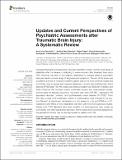| dc.contributor.author | Zaninotto, Ana Luiza | en_US |
| dc.contributor.author | Vicentini, Jessica Elias | en_US |
| dc.contributor.author | Fregni, Felipe | en_US |
| dc.contributor.author | Rodrigues, Priscila Aparecida | en_US |
| dc.contributor.author | Botelho, Cibele | en_US |
| dc.contributor.author | de Lucia, Mara Cristina Souza | en_US |
| dc.contributor.author | Paiva, Wellingson Silva | en_US |
| dc.date.accessioned | 2016-08-09T14:52:56Z | |
| dc.date.issued | 2016 | en_US |
| dc.identifier.citation | Zaninotto, Ana Luiza, Jessica Elias Vicentini, Felipe Fregni, Priscila Aparecida Rodrigues, Cibele Botelho, Mara Cristina Souza de Lucia, and Wellingson Silva Paiva. 2016. “Updates and Current Perspectives of Psychiatric Assessments after Traumatic Brain Injury: A Systematic Review.” Frontiers in Psychiatry 7 (1): 95. doi:10.3389/fpsyt.2016.00095. http://dx.doi.org/10.3389/fpsyt.2016.00095. | en |
| dc.identifier.issn | 1664-0640 | en |
| dc.identifier.uri | http://nrs.harvard.edu/urn-3:HUL.InstRepos:27822215 | |
| dc.description.abstract | Neuropsychological and psychiatric disorders represent a major concern and cause of disabilities after the trauma, contributing to worse recovery after traumatic brain injury (TBI). However, the lack of well-defined parameters to evaluate patient’s psychiatric disorders leads to a wide range of diagnoses and symptoms. The aim of this study was to perform a review of literature in order to gather data of the most common scales and inventories used to assess and diagnose depression, anxiety, and posttraumatic stress disorder (PTSD) after TBI. We conducted a literature search via MEDLINE, PubMed, and Web of Science. We included reviews, systematic reviews, and meta-analysis studies, and we used the following keywords: “traumatic brain injury OR TBI,” “depression OR depressive disorder,” “anxiety,” and “posttraumatic stress disorder OR PTSD.” From 610 titles, a total of 68 systematic reviews or meta-analysis were included in the section “Results:” of this review: depression (n = 32), anxiety (n = 9), and PTSD (n = 27). Depression after TBI is a more established condition, with more homogeneous studies. Anxiety and PTSD disorders have been studied in a heterogeneous way, usually as comorbidity with other psychiatric disorders. Some scales and inventories designed for the general community may not be appropriate for patients with TBI. | en |
| dc.language.iso | en_US | en |
| dc.publisher | Frontiers Media S.A. | en |
| dc.relation.isversionof | doi:10.3389/fpsyt.2016.00095 | en |
| dc.relation.hasversion | http://www.ncbi.nlm.nih.gov/pmc/articles/PMC4906018/pdf/ | en |
| dash.license | LAA | en_US |
| dc.subject | Review | en |
| dc.subject | traumatic brain injury | en |
| dc.subject | psychiatry | en |
| dc.subject | depression | en |
| dc.subject | anxiety | en |
| dc.subject | posttraumatic stress disorder | en |
| dc.subject | assessment | en |
| dc.subject | scales | en |
| dc.subject | inventory reporting | en |
| dc.subject | questionnaires | en |
| dc.title | Updates and Current Perspectives of Psychiatric Assessments after Traumatic Brain Injury: A Systematic Review | en |
| dc.type | Journal Article | en_US |
| dc.description.version | Version of Record | en |
| dc.relation.journal | Frontiers in Psychiatry | en |
| dash.depositing.author | Fregni, Felipe | en_US |
| dc.date.available | 2016-08-09T14:52:56Z | |
| dc.identifier.doi | 10.3389/fpsyt.2016.00095 | * |
| dash.contributor.affiliated | Fregni, Felipe | |


